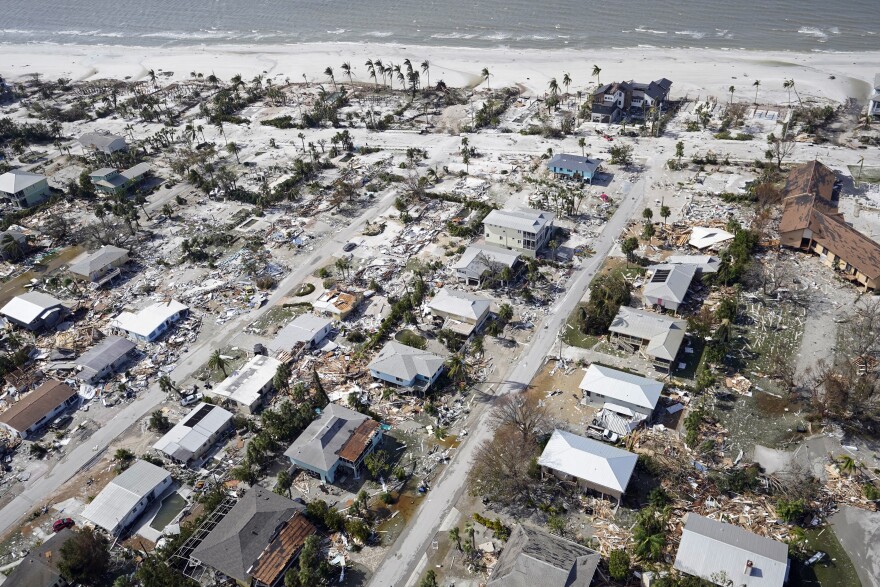GAINESVILLE, Fla. – Downed trees, broken windows, flooded rooms and damaged cars are some of the issues affecting families in the aftermath of Hurricane Ian. The Category 4 hurricane has left thousands of Florida residents struggling with basic needs, and many organizations are making donation and volunteer opportunities available to the public.
Hurricane Ian shifted its course to the east before making landfall just after 3 p.m. Wednesday, catching residents off guard. Many people who could not evacuate are experiencing flooding and infrastructure failure. State and local officials are already mobilizing rescue and repair initiatives.
At a press conference in Punta Gorda Thursday morning, Gov. Ron DeSantis discussed the response to the destruction. “This is going to be a 24-7 operation,” DeSantis said. He said people have descended on Southwest Florida to help.
DeSantis said he doesn’t want people to focus on donating material goods. “We don’t necessarily need people to send us stuff,” DeSantis said. “What we need is to be able to help those relief organizations help those folks."
He encouraged the public to make monetary donations to enable organizations to distribute supplies they already have. “Your financial contribution can make a world of difference,” he said. Within the last 24 hours, people have donated more than $2 million to Florida hurricane relief efforts, DeSantis said.
Anyone who wants to pitch in financially can visit The Florida Disaster Fund website or text DISASTER to 20222. This official private state fund was established to provide financial assistance to communities dealing with the aftermath of Hurricane Ian. Florida First Lady Casey DeSantis announced the program’s activation Wednesday.
DeSantis said she is seeing communities come together to help each other. “We just couldn’t be more proud of what you have done to support your fellow Floridians,” she said. Both the governor and his wife expressed how impressed they have been so far with recovery efforts and the resilience of residents affected by the hurricane.
The Red Cross is also accepting donations on its website. Red Cross representatives said they will provide food, supplies and shelter to those displaced by the storm. Other volunteer opportunities for people who want to help include the Red Cross Disaster Action Team and the Red Cross Disaster Mental Health team.
Ninety percent of the organization’s workforce is made up of volunteers, according to the Red Cross website. To find Red Cross volunteer opportunities by ZIP code, click this link.
The Red Cross is also experiencing a blood shortage that has worsened following the hurricane. To donate blood, call 1-800-733-2767 or search for blood drives by ZIP code at this link.
Feeding Florida is a partner state association of Feeding America, the nation’s leading hunger-relief organization. The organization is collaborating with its statewide network of food banks to provide food to hurricane victims. People can donate at a local food bank or make a monetary donation at this link.
Florida Division of Emergency Management Director Kevin Guthrie reminded residents in hurricane-affected areas to continue to be mindful of storm safety. He spoke about indirect deaths from incidents involving chainsaws, ladders and power lines. “We have significantly more indirect deaths from disasters that are 100% avoidable than we do the disaster itself,” Guthrie said.
He urged people to leave large and risky projects to the professionals. “Please stay out of the area and let us do our job,” Guthrie said. He said people who go out after the storm to inspect the damage are putting themselves in danger and getting in the way of rescue or repair crews.
At a Thursday 7:30 p.m. update, the governor related what he had seen as he surveyed the damage in Charlotte County. He said the Sanibel Causeway is damaged in multiple areas. He described a house that had been flushed out into the middle of Estero Bay. “We absolutely expect to have mortality from this hurricane,” DeSantis said.
The most urgent issues to address in the first 72 hours after a storm are life safety and restoring services like communication, power and fuel, DeSantis said. Rescue crews, first responders and members of the National Guard are going to devastated communities to help people access these resources.
DeSantis said those affected will bounce back, but everyone must come together to pave the way for them.
___
This is a breaking news story. Check back for further developments. Contact WUFT News by calling 352-392-6397 or emailing news@wuft.org.

